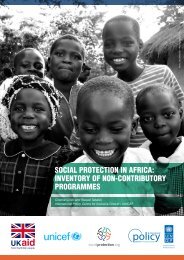https://goo.gl/sZ7V7x
293g79C
293g79C
Create successful ePaper yourself
Turn your PDF publications into a flip-book with our unique Google optimized e-Paper software.
MAURITANIA<br />
Prise en charge des soins de santé des indigents—Indigent Health Coverage<br />
Programme<br />
Country<br />
Geographic area<br />
Prise en charge des soins de santé des indigents—Indigent Health Coverage<br />
Mauritania<br />
Sub-Saharan Africa<br />
Previous programme name (if any)<br />
Start date The programme has been in place for decades, 1<br />
but the cash transfer component was initiated in 2012.<br />
Programme objectives<br />
To ensure free access to health care for destitute persons suffering<br />
from a chronic health condition or cancer; recently, a cash transfer<br />
component was added to help improve the living conditions of beneficiaries.<br />
Programme type<br />
Non-contributory health insurance, unconditional cash transfer<br />
Programme components<br />
The programme provides grants to national hospitals to cover health services for<br />
programme beneficiaries and covers evacuation costs to neighbouring Morocco,<br />
when necessary; evacuees benefit from a special cash allowance to cover living<br />
expenses during their stay abroad. In 2012, a cash component was added to the<br />
programme to help with the living conditions of beneficiaries.<br />
Conditionalities (if any)<br />
Targeting methods<br />
Self-targeting<br />
Target areas<br />
National programme; benefits are currently being delivered<br />
in Nouakchott; however, any Mauritanian national can apply.<br />
Target groups<br />
People who are destitute<br />
Eligibility criteria<br />
Beneficiaries are destitute persons suffering from a chronic health condition<br />
(such as renal insufficiency, mental illness or diabetes) or cancer. Applicants<br />
need to present a certificat d’indigence delivered by the commune where they<br />
reside as proof of their socio-economic situation, a national identification card<br />
and a medical certificate delivered by a specialist. 1<br />
Eligibility reassessment (if any) Annually<br />
Type of benefits<br />
Free access to health care, free medical evacuation<br />
(when necessary) and an annual unconditional cash transfer.<br />
Amount of benefits<br />
The annual cash transfer is MRO30,000–50,000 (USD90–150)<br />
(depending on the socio-economic and medical profile); evacuees<br />
are granted MRO200,000 (about USD600) for living expenses.<br />
Payment/delivery frequency Cash transfer component: annually<br />
Benefit delivery mechanism Treasury cheque<br />
Benefit recipients<br />
Minimum and maximum<br />
duration of benefits (if any)<br />
Coverage<br />
603 (in 2015), out of which 99 had chronic illnesses,<br />
210 had cancer,153 required dialysis, and 141 were evacuees.<br />
Programme expenditure<br />
Total expenditure in 2015: MRO1,035,000,000 (about USD3,135,000)<br />
Institutions and agencies involved The programme is managed by the Direction de l’Assistance Sociale<br />
et de la Solidarité Nationale (DASSN), which is part of the Ministry of Social<br />
Affairs, Children and Family, in collaboration with the Ministry of Health.<br />
Monitoring and evaluation<br />
mechanisms and frequency<br />
A database has been set up with the help of the Agence Nationale de<br />
Registre de la Population et des Titres Sécurisées (ANRPTS); beneficiary<br />
dialysis patients submit weekly sign-off sheets; and there is an annual review<br />
of cases with the National Health Council (Conseil National de la Santé).<br />
See the references on page 180: Prise en charge des soins de santé des indigents—Indigent Health Coverage<br />
Social Protection in Africa: inventory of non-contributory programmes | 85



